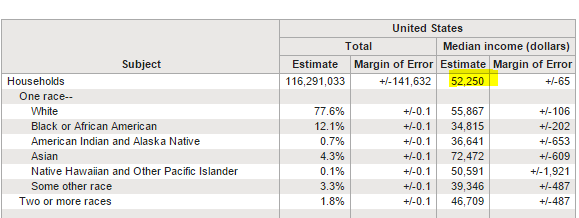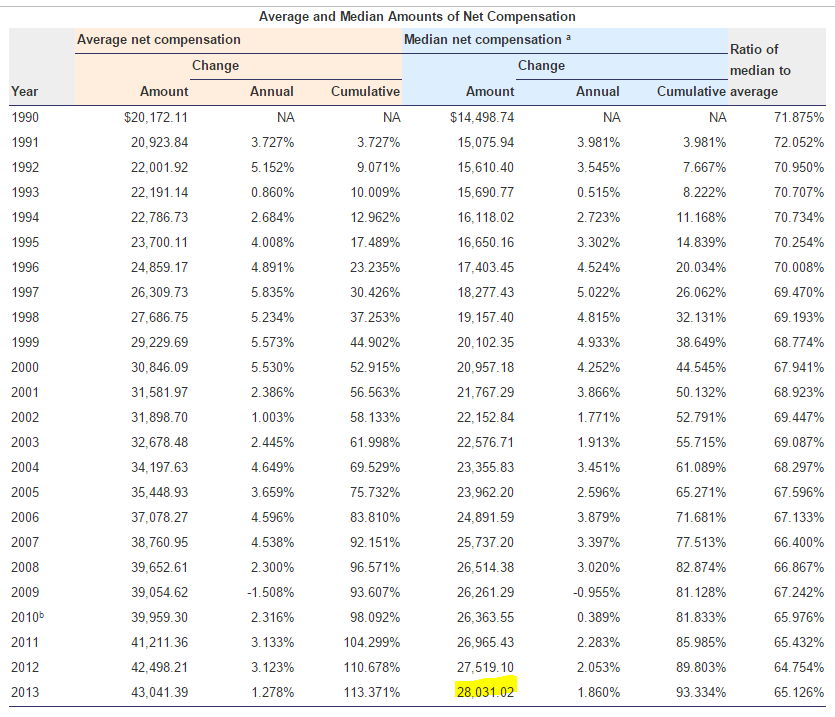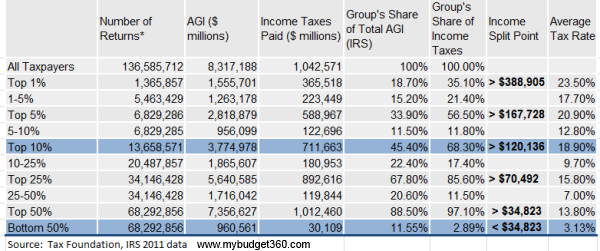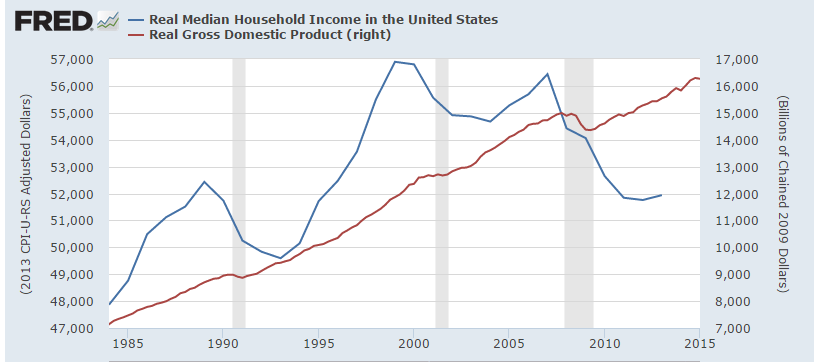How much do Americans earn in 2015? A comprehensive look at household income and individual earnings. GDP disconnects from household income.
- 12 Comment
How much do Americans earn? This is an important question to ask given our consumption based economy. Each household has a propensity to spend and the ability to consume is largely derived by income. Debt has made it easier for households to spend future wages but we need to find out two important reference points to measure the health of household income: total wages for households and that of individual workers. What we are seeing is a growth in lower wage jobs and the cost of living eating into wages leaving a smaller amount of disposable income each month. I’m still surprised as to how many Americans overestimate wages for US households. The US is still the top economic country in the world but we are quickly seeing our middle class disappear. Middle class is an ambiguous catch-all category but at the core, it means a family is earning enough for buying a home, putting your kids through college, and having enough in retirement that you are not begging on the streets in old age. So how much do Americans earn?
How much do Americans earn?
There isn’t one universal place to find the typical earnings for Americans at a very micro level. So we are left looking at the three most readily available sources:
-1. US Census data
-2. Social Security data
-3. IRS tax return information
With this information we can get a fairly good estimate to what Americans are earning. It is hard to get a truly accurate figure because you also have people being paid in cash but with three sources of data, you can get a really good picture of the typical American when it comes to income.
First, let us take a look at US Census data:
Source:Â US Census
This is the most comprehensive look at US household income data. According to the latest Census data the median household income in the US is $52,250. Of course inflation eats away at purchasing power and things like housing and college tuition are quickly outpacing wage gains. Is this higher or lower than you would expect? I find that the mainstream press tends to overestimate how much households earn. Typically you will hear that a household earning “$250,000 is middle class†but by definition, they are anything but middle class. The middle class is easily quantifiable making roughly $52,000 per year.
The next source we will look at is Social Security data:
Source:Â Social Security
The nice thing about this data is that it captures all workers that pay into Social Security which is the majority of the population. It is also looking at real wages versus hypothetical figures. What is useful about this data is that we can see how much is earned by individual workers. According to Social Security data, the median net wage for a working individual in the US is $28,031. That makes sense given the typical household income is around $52,000 and most households need two workers to make ends meet. This has created a two-income trap for many. Sure, more income is coming in but more is also going out, especially if a family has kids and needs to pay for childcare and college later in life.
Finally, let us take a look IRS tax data:
Source:Â IRS
According to IRS tax data, the middle point for tax returns is $34,823. This would make sense given there are many single households out there as well and with AGI, you are looking at lower figures thanks to deductions and adjustments. 67.8 percent of households make $70,492 in taxable income a year or less. A household making $167,728 a year or more is in the top 5 percent of US households. To make the top 1 percent you would need a household income of $388,905 or more.
So this should give you a good overview of what the typical American household and individual earns. Why does it seem like many families are falling behind? Part of it has to do with growth and productivity gains not making it into the wallets of workers:
While Real GDP continues to grow at a steady pace real household income is back to where it was a generation ago. I also tend to believe that this trend is understating inflation (this eats into wages) since the CPI doesn’t track inflation all that well by using things like the owners’ equivalent of rent instead of true housing values or making tuition a tiny portion of the basket (for many young Americans, college is the biggest expense). For a consumption based economy asking “how much do Americans earn?†is a vital key to our long-term stability. By looking at three independent sources, we can get a good estimate as to the income vitality of Americans.
If you enjoyed this post click here to subscribe to a complete feed and stay up to date with today’s challenging market!12 Comments on this post
Trackbacks
-
Ame said:
It’s as if those who say the average American makes $250K a year are those who actually DO make that. Those in the media, that is.
For some reason, they either must really think they are average middle-class types or else they know that they are of the top percentile and want to perpetuate a myth that my neighbor makes way more than my household income of $50K. Thus, this will make most schmucks like me think the economy is booming for everyone else BUT me. (and so thinks all the others like me)
But to what end? Why would the mainstream media do this to the average household’s view of how well they are doing? Do they actually WANT the average 50 percentile to feel class-envy? Do they actually WANT to foment a class war?
June 22nd, 2015 at 4:13 pm -
Tom H said:
Ame, “Do they actually WANT to foment a class war?”
Yes I believe they not only want to foment a class war, but they have been fomenting it for yonks.
The only way to take over a free people is to divide them:
Rich vs. poor
Black vs. White
Gay vs. Straight
Christians vs Muslims
Pro choice vs Pro Life
Democrat vs Republican
Liberal vs conservative………… etc.In the meantime, while we are all busy clonking each other over the head for these nonsense divisions, we have the TPP, NDAA, Patriot Act, Monsanto Protection Bill, TARP bailout of bankers, debt based monetary Ponzi scheme, illegal wars, war crimes, torture, LIBOR, rigging, Forex Rigging, Silver and Gold Rigging, derivatives, false flags, corporations owning almost every media outlet, tyranny and a police state.
If they don’t continue fomenting these divisions of the American people, some of them might notice the high crimes and misdemeanors. And then what? To what end?
June 28th, 2015 at 6:31 pm -
Jon said:
No, they want people to spend beyond their means when they covet the product placements in the shows they spend up to 18 years of their life watching on the TV.
June 29th, 2015 at 10:17 am -
Whitney said:
I find it funny to find some of these reports saying the average worker pay in the US is about $24 an hour. Um…no. Not even a little bit close. If you average it out including the high earners, sure, but take a look at any job board and you’ll see a huge number of jobs under $15 an hour. $24 an hour would be about $50,000 a year per individual on average. Which is not an accurate picture at ALL of what is going on. Average household income – often including the income of at least two people – is about $53,000 a year. The average single person white american income is about $15 an hour.
If you are making anywhere north of $50,000 a year as an individual, you are definitely in the top 75% of earners. I’m not sure why there’s so much focus on HOUSEHOLD income, because this does very little to tell you about what the average person with the average job is making BY THEMSELVES. I’m talking your average unskilled worker with less than 6 years of college (only a third of American adults over the age of 25 have 4 years or more or college education, fewer still have a masters or higher) – the type of person who is not paid in salary but rather, hourly. Your warehouse positions, delivery positions, office staff, etc.
Household income also hides the gender gap in pay. A household income may be $53, 54,000 a year, but how much of that is the wife’s pay (assuming there’s a wife)? Much more effective to look at average pay for a given level of education for an individual of a given gender and race. That’s where you really begin to see the disparity set in. Black Americans average a mere $18,000 a year while white americans average just under $27,000 a year – and if you look further e.g. black women compared to white men, the gap is even more considerable. It’s not right, but it is the way things currently are in the United States.
March 31st, 2016 at 2:39 pm -
Blake said:
Whitney,
When you look at a job board, there are obviously going to be more jobs under $15 per hour than over. Less desirable jobs that pay less have higher turnover rates and thus have to list openings more frequently. This is not an indication of wages in America. There is a reason high paying jobs are more competitive, there are fewer of them, but in turn, less people actually qualified to perform the minimum job functions.
The reason the focus is on household income is because that is how taxes are filed. They aren’t running around to every company or every person in the US asking them how much income is out there, this data is based on the IRS statistics. Also, you shouldn’t distinguish salary vs hourly employees. Often times salary workers work many more hours than a typical hourly employee does, but is not compensated for overtime. This means that on a per hour basis, it can be true and often is true, that they are making less than the $15 per hour average.
There is a true correlation between number of years spent in higher education and income level, but wouldn’t you expect this? The harder you work to learn certain things, the longer you gain experience in certain skill sets desirable to an employer should correlate to a higher wage. Taking education out of it, one would expect a welder with 3 months of experience to earn less than a master welder that has been at it for 15+ years based on the expectation of the quality of work performed and the finished product that is then purchased.
Gender gap pad is a misleading statistic. The one that is often sited is simply average male income vs average female income. Other factors such as education/experience, number of hours worked and job type are not brought into the equation. In free commerce, if an employer could pay a woman less than a man to do the same job, they would do it every time. That would allow them to retain more money and ultimately positively affect their bottom line.
You also contradict yourself by saying that you need “to look at at average pay for a given education level for gender and race” but then when giving the statistics on pay disparity between blacks and whites, there is no mention of education. Those are national averages and do not coincide with any education data. To say that whites inherently have an advantage with higher education is another topic in and of itself, but the way the system is set up it actually allows anyone of a minority class a better chance at getting into a college or being awarded a scholarship or grant than an equally qualified white person.
The way thing currently are in the US are simply not as bad as you lead on. Many of the major issues can be seen cultural and social differences between races and/or genders and are not a direct result of the system. I only wrote this because your comment is a poor understanding of the statistical data. For what it is worth, I am in the bottom 50%, living off of unemployment. My view is not skewed because of where I lie on the pay scale.
June 15th, 2016 at 9:37 pm -
Ryan said:
Umm…I make abouit 100k (not even including my 2 businesses) and my girlfriend makes 50k. I am only 29 so we make a household income of $150k and its pretty nice. We have no kids. However, I still don’t feel like this is that much money. We aren’t able to travel that much and it’s not like we always have money. Even $150k a year is not that much. I never want to know what it would feel like to live on $50k as a household income…eek!
August 16th, 2016 at 11:58 am -
Mikey said:
Lol @ Ryan.
August 21st, 2016 at 2:40 pm -
Jack said:
@ Ryan
Wow I live off of about $34,000 before taxes(so take about 25% off) a year, and people around here consider me paid a little above average. I don’t have a clue what you’re talking about. Haven’t lived a hard day in your life I take it.September 24th, 2016 at 2:58 pm -
Karen said:
I also make 34,000 before taxes, but I live in a low cost of living city. I have a bachelor’s degree in graphic design and over a decade of experience to get that wage here.
Here, I can rent my 364 sq. ft. efficiency apartment for 460 a month, heat, water, gas and electric included. Other larger one bedrooms may cost around 600 a month and then you have to pay some utilities. I’ve seen some 2 bedroom homes in nice condition for 70-80k in decent areas of town and some 2 bedroom homes for over 100k in the more affluent areas of town. 3 bedroom homes might be a little higher, usually up to 130-140k depending on size and location. Some cities have a much higher cost of living than where I live. Making 34k there would feel much more difficult.
October 1st, 2016 at 7:00 pm -
Mike said:
A good deal is only what you think it is. Some people think 34k a year is a lot/ and some people think it’s poverty. Honestly, I think it’s all relevant. I make 95k and the wife makes 34k part time. I am 30.
October 25th, 2016 at 7:04 pm -
Brian said:
This is so misguided.
People that actually work at a job are not typically “rich” as in 1% rich, nor are people that make just over $400k/year super rich as defined by the new tax code.
The real problem is the tax code itself that allows income from capital gains; i.e. Buying and selling property, stocks, bonds, securities, currency, which is what actually rich people do as opposed to working an actual job have that TYPE of income taxed at a much lower rate than the actual aggregate income of a family that works hard at successful jobs and makes decent livings.
To put this in perspective I live in Loudoun county VA, the wealthiest county in the US. I’m a Liscened Surgical First Assistant and my Wife is a critical care RN.
We are firmly in the middle class. We make roughly $200k/ year between the two of us and we pay 32% of our income to the US treasury dept. I’m currently in debt to the US government over $24,000.
Conversely there’s a very prominent family in our county that is worth 18 billion dollars. Every cent they make is taxed at a rate of 16% due to capital gains loophole. They make well over $100 million/year.
And I’m taxed at a higher rate than them.
This is ludicrous.November 23rd, 2016 at 7:05 pm -
Sue said:
Whitney is completely correct. Blake and Ryan are living in fantasy land. Your cases are not indicative of the average american and therefore, irrelevant. I’m willing to guess also that you both come from privileged backgrounds. You are bending statistics to make anyone not lucky enough to be you look bad.
August 13th, 2017 at 9:32 pm




 If you enjoyed this post click here to subscribe to a complete feed and stay up to date with today’s challenging market!Â
If you enjoyed this post click here to subscribe to a complete feed and stay up to date with today’s challenging market!Â